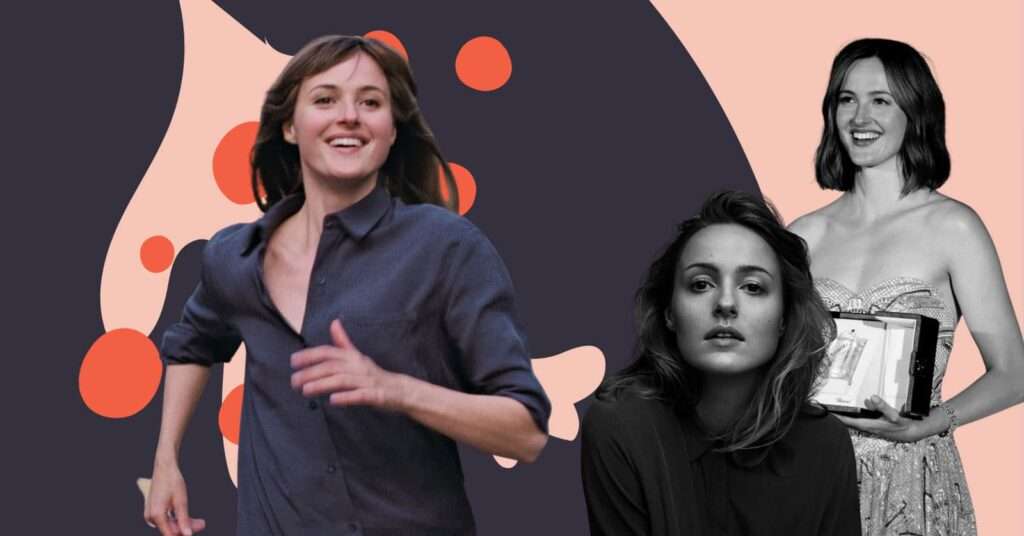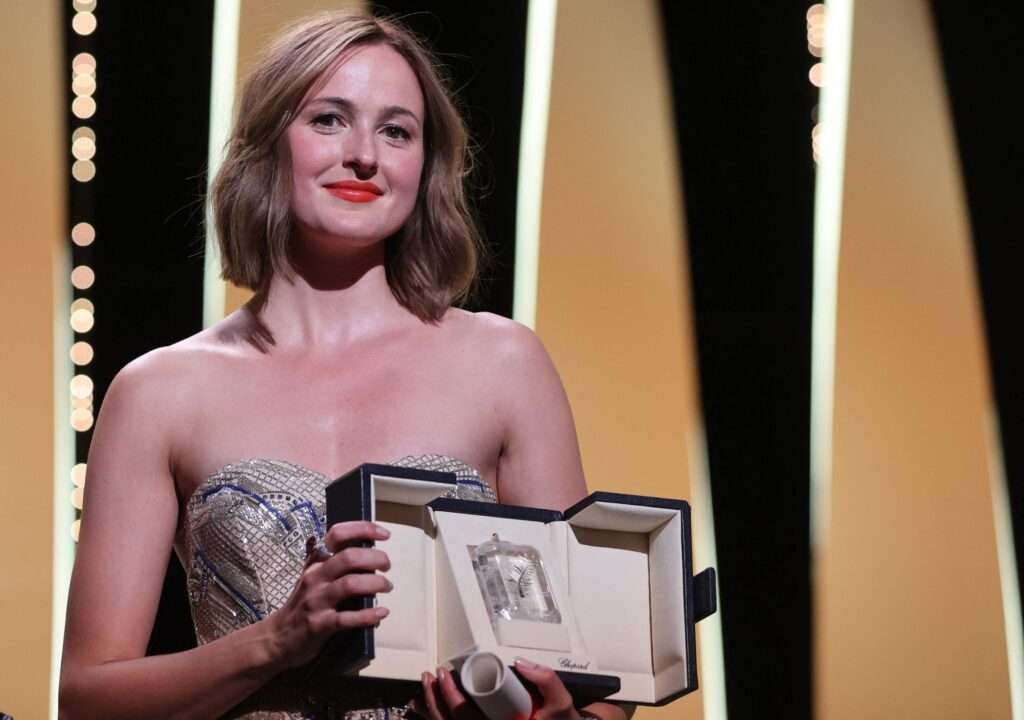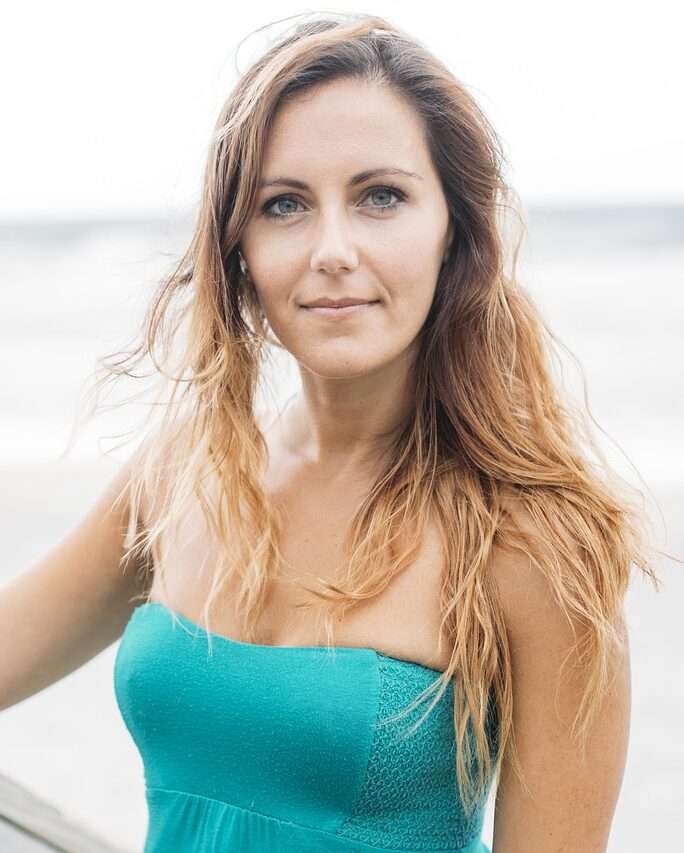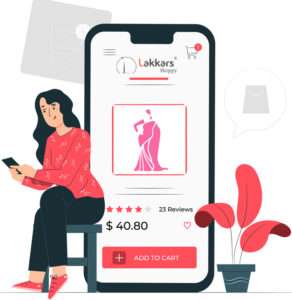
Meet Renate Reinsve, the Norwegian actor stealing Hollywood’s heart
What does it mean to be an adult woman today? Is it an age or a stage? Parenthood, a steady partner, a career or a home of one’s own? Julie, the central character in The Worst Person in the World, shimmies through her 20s to arrive at her 30th birthday with none of these. She’s unmoored, restless, fancy-free – a romantic adventurer and the charismatic subject of a story that is traditionally told about men. As Julie herself puts it, lobbing a grenade into a cosy gathering of her older lover’s friends: “I feel like I know everything about male problems. It’s in all the books and movies. Where’s the menstrual period, orgasm and desire?”
They’re all here, in an existential comedy of metropolitan twentysomething life from the Norwegian director Joachim Trier that has had Hollywood royalty queuing up to pay homage. “It’s so brilliant and it wrecked me. I was crying in a way that was like, weird,” said Dakota Johnson. Jamie Lee Curtis enthused: “This is a marvel of a movie… a deep look inside self-love and what drives us.” But, for all that Barack Obama listed the film among his favourites of 2021, it might all have seemed a little too wafty, a little too hung up on male handwringing, were it not for the transfixing central performance of Renate Reinsve.
Previously unknown beyond Norway, the 34-year-old actor has captured the zeitgeist just as surely as the lovers in Sally Rooney’s Normal People, winning the best actress award in the film’s first outing to last summer’s Cannes film festival. “There is energy, there is something extraordinary, vivacious in her performance. Something alive that you just can’t define, but you can feel it,” said Isabelle Huppert at the time.
Reinsve’s achievement is all the more startling given that the film offer came through the day after she had decided to give it all up. “After acting school, I did some really great theatre. But somehow I ended up in film and TV doing a lot of roles that were mostly one-dimensional functions of the plot. So I had actually decided to quit. I had this big moment where I made that decision to do something else. And the very next day, Joachim called me. It was the weirdest coincidence,” she says.
She’s in London for a Valentine’s weekend charm offensive, just days after learning that she is up for her second best actress award, one of two Bafta nominations for the film, which has also just bagged Oscar nominations for best original screenplay and international feature film. There’s a sense that the whole production team have been ambushed by their own wildest desires: the interview is scheduled for Saturday morning at two days’ notice, and there’s a scurrying along the corridors of the Soho hotel that has become their temporary base camp.
When our conversation is delayed for half an hour because Reinsve has insisted on a change of costume mid-photoshoot, I wonder if success might have gone to her head. But the woman who breezes into the room in a slinky beige trouser suit is open, unaffected and wryly amused by the fact that she now has a stylist in tow. The problem, it turns out, was a dress with puffy arms. “It looked really cute. But I don’t know… I just needed to feel a little bit cooler today,” she says.
For an actor with no previous experience of the promotional merry-go-round, The Worst Person in the World poses a particular challenge, raising repeated questions as to how close Reinsve’s own opinions and values are to Julie’s. In 12 “chapters”, bookended by a prologue and an epilogue, the film interrogates such millennial issues as: “Can you be a feminist and still enjoy oral sex?” At its heart is Julie’s push-pull relationship with a comic-book artist, Aksel (Anders Danielsen Lie), whose very different perspective on life is shaped by the fact that he is 15 years older than her. He has made his name with underground comics she finds sexist; he wants to have children, but his attempt to integrate her with his social circle gives her a glimpse of family life that appals her.
Does Reinsve herself identify with that experience? As far as having children is concerned, no, she says. “I have a lot of empathy and respect for Julie’s position, but it isn’t something that I am myself passionate about.” But that’s not to say there aren’t resonances. “Sometimes I’ve also been with guys who think they’re stronger because they can keep their cool, or they know exactly what to say and how to say it, so they kind of have an overview over the situation while I’ve been in a mess and chaos.”
But then she skilfully steers it back to Julie, not knowing what to do with her life. “She’s in a big, divisive, existential vacuum. I was afraid that she would seem passive, because she is there seeing what the situation is, and having trouble making choices. But I wanted that to be like a wise, strong place to be, because it’s the start of any progressive movement in one’s own life. She’s actually exploring what it is to be in that social structure. I don’t think she’s doing it consciously. But she is trying to really find out what it’s all about before making any big choices.”

One of her choices is to leave Aksel for a barista she meets after gatecrashing a party. In the film’s most talked about scene, time is frozen for everyone but Julia, who tears across Oslo to declare her love for Eivind (Herbert Nordrum). The scene was shot in real time, with extras brought in to stand still in the streets while the traffic was temporarily stopped, capturing the heart-stopping power of an infatuation that suspends reality. It’s so reckless that you know it won’t end well. “When she makes a choice, it’s a shitty choice a lot of the time – and that’s very true,” says Reinsve. “I feel I’ve made so many bad choices in my life. I really connect to that way of being. I’ve broken up with people who could have been really great for me, or gone into relationships that were really bad for me. And you don’t know the consequence of your choices before you’ve lived that choice. So it’s impossible to make a good choice, isn’t it? c and try to be happy with what you have.”
One look at Reinsve’s biography makes it clear that she is very far from the sum of her bad choices. Growing up in a tiny settlement – “a really, really small place, just like a road with some houses and farmlands all around” – she spent much of her early childhood hanging around the hardware store her grandfather had founded, which employed most of her family. When I ask how many siblings she has, she goes quiet for an unusually long time, before finally deciding that the answer is three. Why the hesitation? “Because there are a lot of step-sisters also. We’ve been a lot of girls, but three are my sisters.”
At school she became a competition swimmer. “I did it, like, five times a week, with competitions once or twice a week. So it was quite a lot.” But though she was always busy, and surrounded by people, she was clear by her mid-teens that it wasn’t what she wanted, so at 17 she absconded to Edinburgh. “I had a lot of good things, but I also had a lot of bad things. I was quite sad and angry. So I ran away and tried to grow up by myself,” she says, adding that she’d originally intended to go to Costa Rica because it was warm, but she didn’t have any money, and discovered she could fly to the Scottish capital for £1. “Crazy, yeah? Not good. They can’t have treated their employees very well.”
In Edinburgh she worked in a bar and “partied a lot with my new friends”. She also got involved with the Fringe, and discovered her vocation. After two years she moved to Oslo “to, like, actually be an actress. I took all the classes, went to acting school. I love books, but I threw them all away except for scripts and books on acting, just to focus. I was very sure about it,” she says.
She was in her early 20s when Trier gave her a single line in his 2011 film, Oslo, August 31st, the second part of a loose trilogy set in the Norwegian capital that culminates with The Worst Person in the World. “I was an extended extra,” she says. “I said: ‘Let’s go to the party’, and tried to bring people to the next location, that was my one task. But Joachim said he liked my energy, so even though I only had one line, I was there for nine days.” Over the years, they became friends; “not close”, she says, “but we always ended up talking about really deep existential stuff, because we’re both interested in putting everything in different perspectives. We talked at a deeper level than I’m used to with my friends.”
For all that, his phone call offering the part of Julie was a complete surprise. Can it really be true that she had decided the previous day to make a career change? Indeed it is, she insists. “I wanted to be a carpenter, because I really enjoy it. I’m not good at it, but I just wanted to do something completely different and something calm. But I also had a big vision of making a group for women to learn to fix things and build stuff together.”
The story of how she got to that point offers a clue to why she is not Julie, but has managed to turn Julie-like choices, which might have been disastrous, to her advantage. She had recently bought a house, she says. “I bought it because I was very naive, and it was rotten, so I had to fix the whole house. I learned so much, and I found it really empowering and meditative to build. It’s so concrete. It’s the opposite of acting, in many ways. You have to be creative, but you have to know what you’re doing as well. You have to make it structurally sound, don’t you?”
That carpentry plan is now on indefinite hold, while she rides the wave of her new stardom: “Right now, I have no time at all.” She’s trying to plan her next moves, while dealing with an apparently insatiable public interest. “And I don’t know how to do it. I say weird things and do weird stuff, and act like a normal person.” In Oslo she is constantly being stopped in the streets. “Whenever I go out, someone always comes up to me. People project their own life and their own perspective on to the film, and that’s what you want when you make a movie: to share it and have the experience together with someone. We asked questions when we made this movie, and I feel we didn’t give any answers. It’s like a big conversation with so many people.”
One of the more painful conversations arises late on in the film, when Aksel is demolished on television for the sexism of cartoons he created years earlier. An estranged Julie looks on in appalled sympathy, after catching the interview by accident on an overhead screen. It’s yet another scene that arouses curiosity about Reinsve herself: “Well, you’re not having that conversation to solve anything,” she says. “I remember when #MeToo came to Norway, and this happened. I just pulled out of the whole movement, because I felt the women were so aggressive. I really felt that’s the wrong way to do it, because we need men also. They, of course, feel really, really bad and vulnerable for having had these views that were imposed on them [by society]. They aren’t just bad people who were born like that. So it’s really, really complicated. To solve it together, and talk about it, is the most important thing.”
Though she’s getting used to being a spokeswoman for such controversial issues, which is way above the pay grade of the average first-time star, she’s considering signing up for therapy once the press tour is over, she says. She’s not being entirely frivolous. “In interviews, you talk so much about yourself and I’m used to having two-way conversations. I’m going to see the therapist and I’m going to say: ‘OK, hello. It’s been a year. Just how fucked up am I?’”

Mrs Vicky m Bournel has made this magazine proud. She is not only an Author from America for Lakkars Magazine she is the Chief Editor of Lakkars Magazine for the articles.
